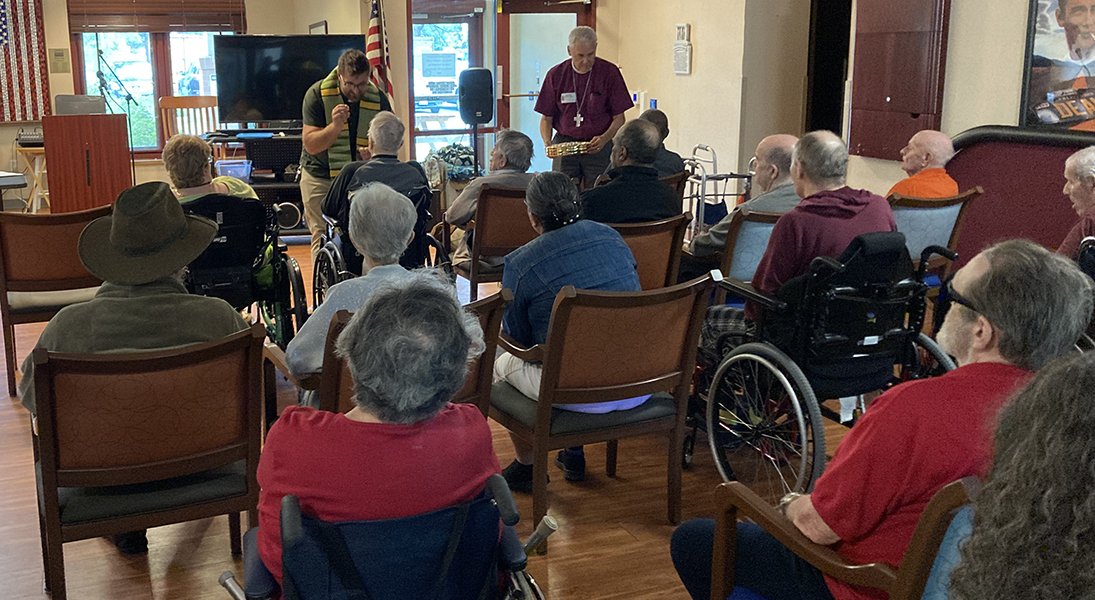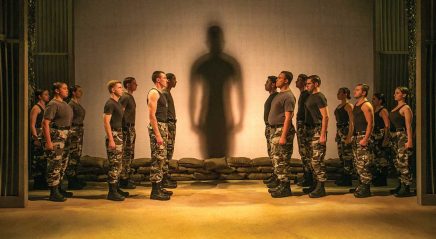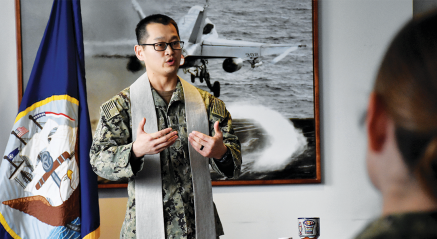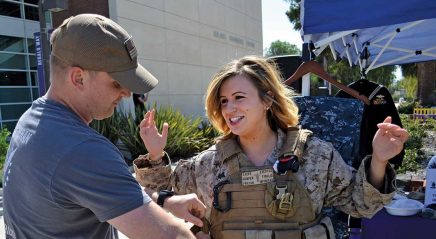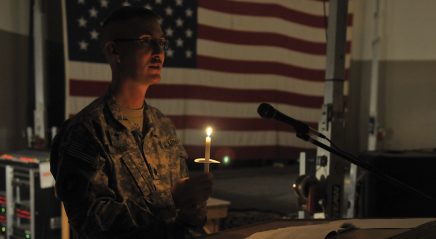With God’s help, you can make a difference in a veteran’s life. That’s the Veterans Day message from Vicky Daub, executive director of the Veteran Servant Corps Project of the Rocky Mountain Synod.
Daub, a volunteer, is passionate about raising awareness of the challenges facing military veterans, taking her message to the synod’s 150 churches on Sundays. She hopes that people will help a veteran in need. But, she said, many simply don’t know how to help.
“God called me to do this work,” said Daub, a 16-year member of Bethany Lutheran Church in Cherry Hills Village, Colo., near Denver. “Every day I’m grateful that I listened to this call. My life was changed for the good for saying, ‘Yes.’”
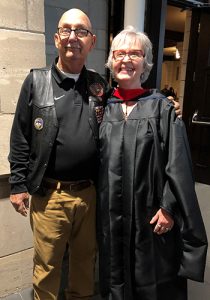
Vicky Daub, shown here with her husband Larry, felt that earning a master’s degree in Christian ministry would better equip her to help veterans. After her graduation from Luther Seminary, St. Paul, Minn., the Rocky Mountain Synod launched the Veteran Servants Corps Project, of which she is executive director.
Daub was led to her ministry after she and her husband, Larry, who served with the Air Force in Vietnam, learned how many veterans die by suicide. In 2020 suicide was the 13th leading cause of death among veterans overall and the second leading cause of death among veterans under 45, according to the National Veteran Suicide Prevention Annual Report. The report noted that there were 6,146 veteran suicides in 2020.
“Larry and I felt like God was asking us to take action,” she said. Larry, she added, was exposed to Agent Orange in Vietnam and knows what it’s like to return home from war.
In 2011 the Daubs began working with another organization to facilitate relationship workshops for veterans. She said veterans often have a lot of challenges when they return from deployment, which puts marriages at risk.
After doing workshops for almost a decade, Daub, a retired math teacher, felt that earning a master’s degree in Christian ministry would better equip her to help veterans, so in 2019 she enrolled at Luther Seminary in St. Paul, Minn.
When she graduated, Daub began to brainstorm with Gary Sandberg, a pastor of Bethany, and Jim Gonia, bishop of the Rocky Mountain Synod, about creating a veterans’ ministry. In 2020 the synod launched the Veteran Servant Corps Project, funded entirely through donations.
Its goals are to provide no-cost retreats at ELCA camps for veterans and their families; training for ELCA clergy and pastoral care support staff to understand veterans’ issues; ideas and materials for veteran awareness and celebrations in ELCA communities; and worship services at veterans’ homes.
Daub also belongs to the Colorado Council of Churches and advocates for state legislation to benefit veterans.
“Many are lonely”
“There are a lot of resources for veterans, but none are faith-based,” said Daub, who made it her ministry to raise awareness of the challenges that veterans encounter. Those challenges, she said, often include loneliness, homelessness, physical disabilities, health problems, unemployment, mental health concerns and other issues. Many have no one to talk to.
“Like all of us, when we get into an emotional space and don’t know where to turn, many of us look to our friend network,” she said. Veterans often don’t have these networks and are isolated. They also look to the church for help, she added.
Daub asked Nic Leither, pastor of Well of Hope, an ELCA mission in Castle Rock, Colo., to offer a monthly interfaith service at a veterans’ home near Denver. “The residents have a faith life,” he said. “My experience is that they have varying degrees of devotion. Some are searching; some are believers; some want to be part of a community. Many are lonely.”
The ministry tries to offer veterans the same care and concern they might receive from any congregation regarding their family, healing, trauma, memory issues or post-traumatic stress disorder.
“There are a lot of resources for veterans, but none are faith-based.”
Colorado is a good place for this ministry because it is home to the Air Force Academy, many military bases and a lot of retired veterans. Sandberg estimates that Bethany has about 20 veterans among its members.
“This ministry is good for the church because it acknowledges that, for so many of our veterans of the Vietnam and Korean wars, the scars are still very real,” Sandberg said. “Some people carry scars, and some have moved on. I don’t know that the church is well-versed in caring for people with challenging situations.
“Supporting veterans is easier than you think. You don’t have to do something grandiose to let someone know that the church supports them.”
Daub said ministries such as this one inform churches about the issues facing veterans, and congregations are embracing the challenge. Her advice to anyone wanting to help a veteran: “Be open to God’s call. God is calling us all to do something.”
Daub said ministries such as this one inform churches about the issues facing veterans, and congregations are embracing the challenge. Her advice to anyone wanting to help a veteran: “Be open to God’s call. God is calling us all to do something.”
How to help veterans
- Talk to them.
- Visit veterans’ homes and ask how you can help.
- Tell veterans to call 988, extension 1, for the Veterans Crisis Line and 877-424-3838 (4AIDVET) if experiencing homelessness or housing instability.



